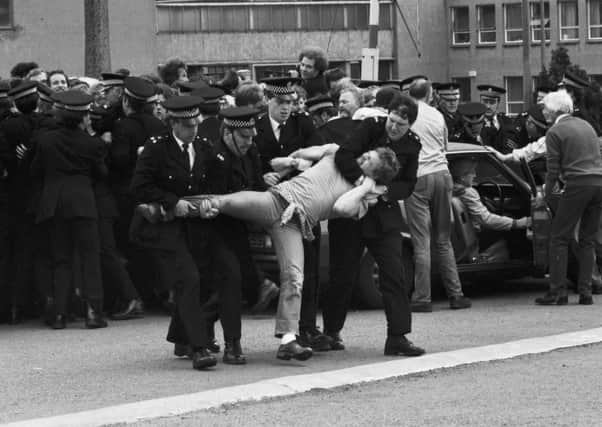Midlothian delight as miners set to be pardoned


Scotland’s Justice Secretary Humza Yousaf made the announcement in Holyrood last week following the publication of an independent review into the matter.
It is believed about 1,400 miners were arrested across Scotland and more than 500 were convicted. The pardons scheme will require new legislation to be introduced by the SNP Government and passed by the Scottish Parliament in due course.
Advertisement
Hide AdAdvertisement
Hide AdFormer Midlothian MP Sir David Hamilton, who was a trade union rep at Monktonhall and was himself arrested, is delighted that he and his colleagues have now been pardoned. He told the Advertiser: “I’m over the moon about it. I’m pleased it’s now coming to an end.
“It’s about all those that have since passed, so I’m really pleased for their families as they can now celebrate.
“Most of them had never been convicted of anything in their life so I’m really pleased for the people that have passed on and the younger people that were also there.
“Although this justice is a bit late, it’s here now.
“The facts didn’t come out until 2015 due to the 30 year rule, which then allowed Neil Findlay MSP to raise the matter in the Scottish Parliament.
Advertisement
Hide AdAdvertisement
Hide Ad“Hopefully the UK Government will take note of this and do the same thing in England.
“I raised the issue at Westminster but until 2015 we didn’t know all the details.”
Former Midlothian councillor Alex Bennett was charged with breach of the peace just before Christmas in December 1984 and fined £100. He got his P45 through the door the next month and was out of work for three years after being blacklisted.
Reacting to the news that he will be pardoned, he said: “I’m absolutely delighted with the result. For years I was so angry about what happened to us.
Advertisement
Hide AdAdvertisement
Hide Ad“It has been a long time coming. We have been at this for six years now. I hope it will put pressure on the Government to do the same down south.”
Midlothian Federation of Community Councils’ chairman Robert Hogg was also one of the 106 miners convicted in the Lothians during the strike of 84-85, and who lost their jobs.
He said: “It has been a long time coming where the miners campaign group have managed to convince the Scottish Government to grant a pardon to those convicted during the strike the vast majority for breach of the peace.
“It is welcomed, especially for those miners no longer with us.
Advertisement
Hide AdAdvertisement
Hide Ad“But On a personal note it does not go far enough as it’s still not clear if all miners will be pardoned and it really means nothing as at the end of the day I was fighting for my job and family and would do the same again if faced with the same circumstances.
“It was a bitter strike and a lot of people and communities were affected by it all.
“Although the miners were defeated in the end, I became a stronger person for it, which has made me the person I am today.”
Commenting, local SNP MSP, Colin Beattie, said: “A great number of local miners from Midlothian and East Lothian have suffered for years due to the excessive convictions handed out during the strike.
Advertisement
Hide AdAdvertisement
Hide Ad“The strike may have taken place 35 years ago, but there is still much anger in many of our local communities about how the miners were treated – and rightly so.
“For decades, hundreds of men and their families have had to deal with the consequences of the strike and their heavy convictions.
“This collective pardon also applies posthumously and is clear evidence of the SNP Government’s aim to right a historic wrong.”
Scotland’s Justice Secretary, Humza Yousaf MSP, said: “The pardon is intended to acknowledge the disproportionate impact arising from miners being prosecuted and convicted during the strike - such as the loss of their job. It will also recognise the exceptional circumstances that resulted in former miners suffering hardship and the loss of their good name through their participation in the strike.
Advertisement
Hide AdAdvertisement
Hide Ad“It is also vital to acknowledge that many officers involved in policing the strike found it an incredibly difficult time – being rooted in their communities and having family members who were miners.”
Comment Guidelines
National World encourages reader discussion on our stories. User feedback, insights and back-and-forth exchanges add a rich layer of context to reporting. Please review our Community Guidelines before commenting.